Friday-Sunday 30 Sept to 2 October ST MARY’S PERIVALE CHOPIN FESTIVAL 2022. 20 pianists play solo recitals over 5 sessions.
Friday 30 September 7 pm Chopin Festival Session 1 :7.00 Viv McLean Largo in E flat, Nocturne in E minor Op 72 no 1, Mazurkas Op 7 nos 1-3, Nocturne in F Op 15 no 1, Polonaise in A Op 40 no 1, Ballade no 3 in A flat Op 47, Scherzo no 3 in C sharp minor Op 39, Nocturne in C sharp minor Op Posth
7.55 Mengyang Pan Grande Valse brillante in E flat Op 18, Waltz in E minor Op Posth, Waltzes Op 69 nos 1&2, Variations on ‘Là ci darem la mano’ Op 2
8.25 Michal Szymanowski Mazurkas Op 6, Nocturne in G minor Op 37 no 1, Impromptu no 3 in G flat Op 51, Nocturne in F minor Op 55 no 1, Waltz in A flat Op 42
What a wonder the start of a three day Chopin festival with some of the finest pianists imaginable.
St Mary’s has never been so full and on a bleak wintery day there was no stopping a public just longing to hear three mini Chopin recitals.There must be hundreds listening in on line too as I was and what a joy it was to hear not only the better known works of Chopin but also some of the rarities too.
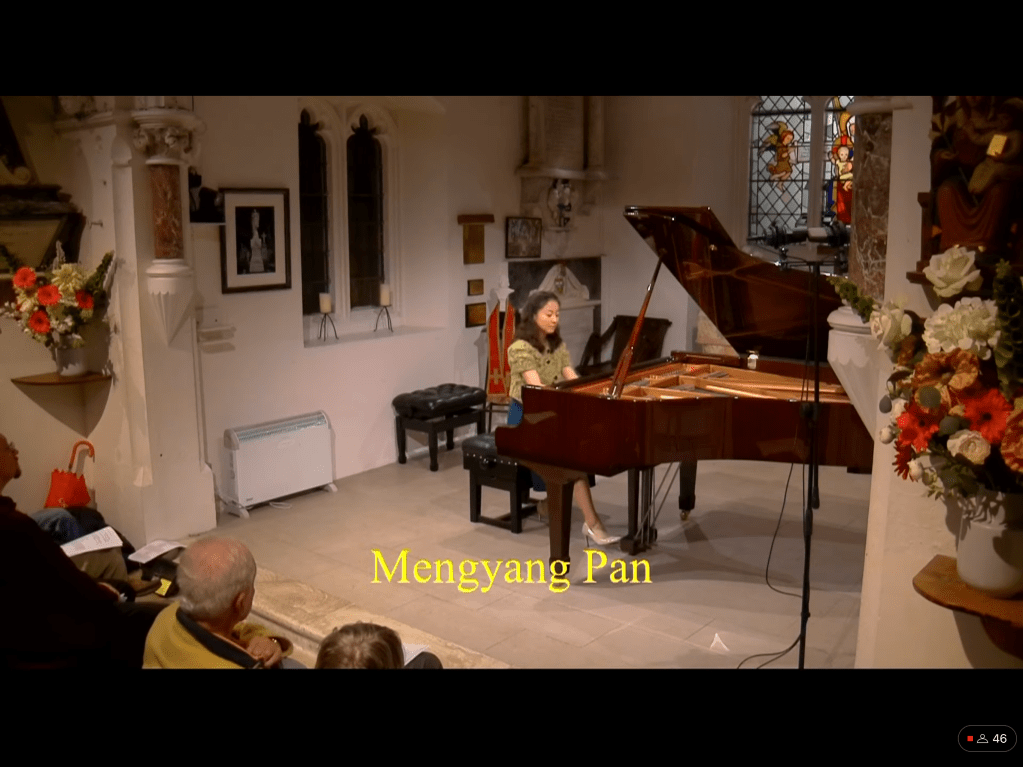
On hearing Chopin himself playing in the Paris salons of the day the variations on La ci darem la Mano op 2 Schumann announced the arrival of a star in their midst with ‘Hats off gentlemen a genius’ and that was only one of his early showpieces.And a show piece it was tonight with a brilliant performance by Menyang Pan.Playing not only with brilliance and breathtaking jeux perlé there was the aristocratic style that she gave to all she played.Some of Chopin’s waltzes were played with such character and colour that was quite breathtaking in its refined beauty and charm.
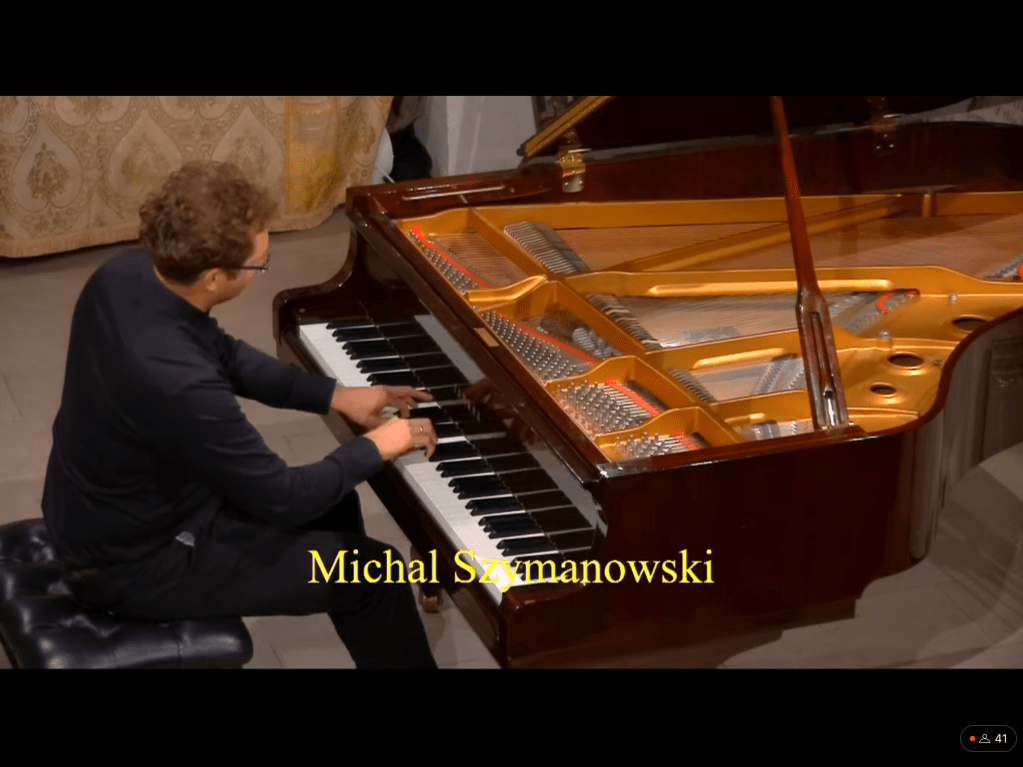
Michal Szymanowski flying in especially from Poland to play a series of Mazurkas that were so full of the zest and spirit of his native land.
Nocturnes too played with such nobility of sentiment ,the same he brought to the G flat impromptu.Playing with the same ravishing colour and charm that Rubinstein used to beguile us with on his much awaited yearly visits to London.The famous waltz in A flat with cross rhythms was played with a sense of line and irresistible rhythmic drive but the astonishing thing was the way he just threw of the final bar with impish nonchalance.

The opening honours were given to a St Mary’s favourite:Viv McLean who started with an almost unknown Largo in E flat that for me was quite a discovery.Finishing though with a ravishing performance of one of Chopin’s best known nocturnes in C sharp minor op.posth.
In between were sandwiched fine performances of the third Ballade and Scherzo and the famous Military A major Polonaise where his sterling musicianship allowed him to steer us so clearly through these well know waters with great artistry.But his performance of the nocturne op 72 n.2 is what will remain with me for a long time for its heartrending simplicity and aristocratic poise.
Two sessions tomorrow and two on Sunday add up to 12 hours of absolute bliss .
I never thought I would enjoy listening to Chopin’s music as much as I did tonight ………..but I missed the wine, the joie de vivre and infectious enthusiasm of Hugh Mather and all his ‘family’ of music lovers in this beautiful deconsecrated church just 20 minutes from the heart of the great metropolis.

Saturday 1 October 2 pm Chopin Festival Session 2 : 2.00 Ashley Fripp Mazurkas Op 24, Impromptu no 1 in A flat Op 29, Nocturnes Op 9 nos 1&2, Barcarolle Op 60
2.45 Amit Yahav Prelude in C sharp minor Op 45, Waltzes Op 64 nos 1&2, Nocturne in G minor Op 15 no 3, Mazurkas Op 56, Scherzo no 4 in E Op 54
3.30 Joanna Kacperek Nocturne in C minor (1837) Waltz in A flat Op 64 no 3, Polonaise in E flat minor Op 26 no 2, Rondo à la mazur Op 5, Scherzo no 2 in B flat minor Op 31
4.00 tea interval
4.30 Andrew Yiangou Nocturne in G Op 37 no 2, Trois Nouvelle Études, Waltzes Op 70 nos 1-3, Andante Spianato and Grande Polonaise Op 22
5.15 Callum McLachlan Waltzes Op 34 nos 1-3, Mazurkas Op 63, Nocturne in E Op 62 no 2, Scherzo no 1 in B minor Op 20

More superb playing from Perivale on the second day of their Chopin Festival .Opening with Ashley Fripp only a few days after his superb solo recital with a scintillatingly subtle jeux perlé account of the first impromptu just thrown off with the charm and ease of another era .Mazurkas and Nocturnes just flowed from his hands with streams of golden sounds and subtle colours but it was the Barcarolle that stood on its own as a true monument and played even more beautifully than the other day.There was an ease and flow but with an aristocratic control that was quite memorable. https://christopheraxworthymusiccommentary.com/2022/09/21/ashley-fripp-at-st-marys-poetry-and-intelligence-of-a-great-musician/
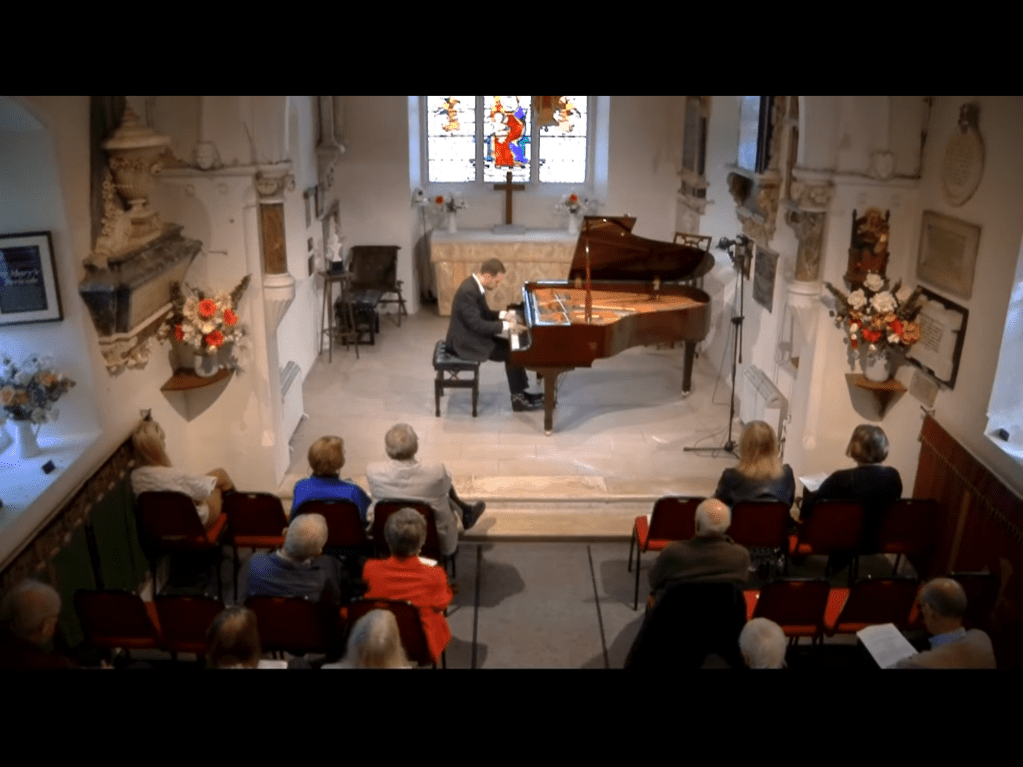
There was such subtle poetry from Amit Yahav with Chopin’s late Prelude op 45 where the layers of sound just flowed in a non stop stream of magic sounds.The mazurkas were played with true understanding but the fourth Scherzo stood out for its nobility and fleeting beauty of one of the most elusive but surely one of the greatest of Chopin’s creations.

And what a revelation was Joanna Kacperek recently married to Andrew Yiangou .

All that she played was gold in impeccable performances of rare beauty from the Nocturne in C minor 1837 to the deep brooding of the E flat minor Polonaise .The grace and charm of the Rondo à la mazur to the mighty sturm und drang of the famous B flat minor Scherzo.It was a ravishing display of born musicianship …..what a wonderfully talented couple she and Andrew are and they are from Ealing ….there is something about the air over that way that is full of the sound of music

And to the last two performances before the supper break .Andrew Yiangou the local boy and now distinguished artist of great authority.The three novelles Etudes written in 1839, as a contribution to “Méthode des méthodes de piano”, a piano instruction book by Ignaz Moscheles and François-Joseph Fétis.Two against three,staccato against legato,three against four a conundrum of technical and mental difficulties that just disappear with the sheer beauty of creation.Andrew played them with great authority shaping these gems into perfect miniatures that Chopin was to develop into his truly masterly op 25 studies that we eagerly await tonight from Patrick Hemmerlé.There was grace and charm that he brought to the waltzes op 70 with ornaments that glistened with oiled brilliance.But it was the Andante spianato and grande Polonaise that Andrew showed us his mastery and authority but not before he had entranced us with the perfumed succulence of the spianato …a term that Chopin was to use only once.

The artistry of Callum McLachlan was breathtaking in its old style grace and charm.The grandiloquence of op 34 n.1 was followed by the heart rending yearning of the op 34 n.2.It was the so called cat waltz that Callum let his hair down and put caution to the wind as this poor cat was treated to a speedy Gonzales romp of youthful verve and audacity.The beauty of his mazurkas were only outdone by the ravishing tone and aristocratic poise of the late nocturne op 62.If his virtuosity and passion were breathtaking in the first scherzo it was the slow Christmas melody that Chopin quotes as an antidote that showed off his true artistry.Such wondrous sounds and colours and a rubato that was of a mature artist way above his 22 years. A great artist in the making and part of a remarkable family of superb musicians .
Chopin Festival Session 3 : 7.00 pm Julian Trevelyan Mazurkas Op 41, Impromptu no 2 in F sharp Op 36, Nocturne in B Op 9 no 3, Polonaise-Fantaisie in A flat Op 61
7.45 Patrick Hemmerlé Allegro de concert Op 46, Tarantelle Op 43, Études Op 25
8.30 interval
8.45 Thomas Kelly Rondo in E flat Op 16, Mazurkas Op 50, Mazurkas Op 67, Nocturne in E flat Op 55 no 2, Ballade no 1 in G minor Op 23

What an opening to the evening session of this Chopin Festival .I knew Julian was good but I did not realise how good
( as Serkin exclaimed on hearing Perahia for the first time )until he started his recital tonight.I have heard him give magnificent performances of the Hammerklavier or Diabelli variations that were absorbing and some times even controversial but today from the very first notes of the four Mazurkas he played there was a sound that was like a daguerreotype photo in its veiled beauty.Like an improvisation and even if the second one almost skidded off the tarmac it was breathtaking in its audacity.The melancholic nostalgia mixed with the dance rhythms in the last one was extraordinary.The pastoral serenity he brought to the opening of the F sharp Impromptu made me think of the similarity to the Barcarolle,that was to come in the last years of Chopin’s life with its outpouring of song and aristocratic climax dying to a mere whisper.The Nocturne op 9 n.3 had all the whimsical beauty of Lhevinne’s historic performance with unbelievably ravishing ornamentation that was truly breathtaking .The Polonaise Fantasie was one of the most moving performances I have ever heard .I remember the first time I heard it was from the hands of Perlemuter with his weight and limpet like legato that I never thought I would hear again until tonight .Even if he split the hands in the opening wave of notes it was done with the beauty of a Volodos and a feeling that this was indeed a great wave of sound moving inexorably ahead.If the right hand did not sometimes wait for the left it was so overwhelmingly convincing.I was surprised by his capricious left hand staccato accompaniment just before the middle episode but it was a prelude to chords of such intensity that followed and that I can only thank God that I lived to hear ( as Curzon said of Lupu’s Beethoven 3.)
All these wonderful pianists but with Julian at the fore like a beacon shining brightly amongst the stars.

Talking of stars there followed immediately after this performance the recital of the remarkable Pollini type figure of Patrick Hemerlé. They are colleagues who frequent each other’s performances and share a mutual discovery of music together.Patrick I have heard many times before but today the poetry he found in Chopin’s studies op 25 left me breathless in admiration.Above all moved by the ravishing sounds and deeply personal character he brought to each of these perfect gems.Patrick is a musician who believes deeply in following the composers wishes and like Pollini it is to Patrick that one turns to hear a score come alive in performance before turning maybe to other performers for a more individual interpretation.He has revealed works as far apart as Villa Lobos Rudepoema or as today the Allegro de concert by Chopin.The score brought to life with superlative musicianship and technical mastery.But today there was even more .Chopin had unleashed in Patrick his soul that he normally keeps hidden behind his superlatively inquisitive mind.It was evident from the opening Allegro de concert ,which is the first movement of a third piano concerto that Chopin never completed.If the opening was surprisingly coquettish it grandually built in sonority and passionate involvement that I have rarely noted in Patrick’s alway masterly performances.The Tarantelle too was thrown off with all the ease and charm that obviously Chopin wanted to convey to the ladies of the Paris Salons.
I have heard Patrick play all 24 Chooin studies in public in a remarkable tour de force of musicianship and resilience.But today was different.Patrick allowed us to look into his soul with a reading of the slow 7th study that was emotionally so moving.Already the tenor counterpoints in the A flat first study had given an idea there was something special in the air.The magnificence of the last study where the waves of sound grew to fever pitch of overwhelming emotion brought a spontaneous standing ovation from the usually warm but shy audience at St Mary’s.
Well they say miracles don’t occur in the same place once but in St Mary’s they certainly happen three times !

Thomas Kelly brought tears to my eyes as I realised that this very talented young pianist that I had spotted five years ago has now become an artist of towering stature.I would go to say after what he shared with us tonight the finest pianist of his generation.
The Mazurkas that he played op 50 and op 67 opened up a sound world and a natural flow of musical invention that I have not heard since Smeterlin or Perlemuter.The ravishing beauty of the C sharp minor op 50 was breathtaking in its beauty and the meaning he dug from deep within the notes …..he found the very soul of Chopin that is hidden deep inside the Mazukas.The wondrous colours of the G major op 67 or the dance like melancholy of the G minor or the deeply contemplative A flat .Thomas revealed a whole world as he found the very soul of Chopin with his limpet like fingers that dug ever deeper into the very heart of the notes.The scintillating Rondo op 16 I had not heard since Magaloff .Thomas played with the same aristocratic style but with ravishing sounds of such radiance and fluidity.The notes just flew from his fingers with the oiled brilliance and consummate ease of a past era.The nocturne op 55 n.2 was played with bewitching sounds that seemed to sparkle in the distance as the melodic line flowed with a constant flow of ravishing sounds.
I have never heard the old G minor war horse open with such beauty and restraint .Thomas restored the G minor Ballade to us in a new costume.All the inevitably traditional rhetoric was gone and instead there were breathtaking moments of discovery.Sounds that took me by surprise as one realised that this young man truly loves the piano and is sharing his great love affair with us.Intimate secrets,canons covered in flowers but above all an aristocratic musicianship that marks him out like Benjamin Grosvenor born into another world …..the world of fantasy and wonder …..the world that only the greatest artists can reach.Exciting because Thomas’s is a voyage of discovery that is always evolving and who knows to,what heights it might lead!
Unbelievably moving performances and indeed an evening that will long be remembered and that luckily was recorded so my words are not only a mere memory as Mitsuko Uchida would say.Thank you Hugh and your team for sharing this world with us ….a truly magic carpet in Perivale
Sunday 2 October 2 pm Chopin Festival Session 4 : 2.00 Dinara Klinton Nocturne in F sharp minor Op 48 no 2, Mazurka in A minor Op 68 no 2, Sonata no 2 in B flat minor Op 35
2.45 Sasha Grynyuk Fantasy in F minor Op 49, Mazurkas Op 30, Waltz in A minor (1843), Waltz in E flat (1840), Waltz in A flat (1827), Waltz in E flat (1830)
3.30 Yuanfan Yang 24 Preludes Op 28
4.15 tea interval
4.45 Martin Cousin Nocturnes Op 37 nos 1&2, Bolero Op 19, Berceuse Op 57, Polonaise in A flat Op 53
5.25 Ignas Maknickas Mazurkas Op 59, Nocturnes Op 27 nos 1&2, Ballade no 4 in F minor Op 52

Another extraordinary line up of pianists for the final day of the Chopin Festival.
Dinara Klinton one of the finest pianists of her generation was so disturbed by events in her native Ukraine that she did not know if she would be able to concentrate today.Persuaded by the ever caring Hugh Mather she played even better than ever .A Nocturne in F sharp minor of such depth of sound and profound beauty followed by the haunting message of the Mazurka in A minor.
But it was Chopin’s great masterpiece of the Funeral March sonata that showed off her aristocratic musicianship and an unerring sense of style that allowed such shape and colour and a ‘rubato ma non troppo’ ( to quote the title of Tito Aprea’s fascinating book).As Hugh commented afterwards there was such an electric atmosphere in the Trio of the Funeral March that you could have heard a pin drop in a hall full to the rafters for this wonderful series .The wind blowing over the graves with Dinara’s superb fingers was a wind of great dynamic force finding refuge only in the mighty final chords.
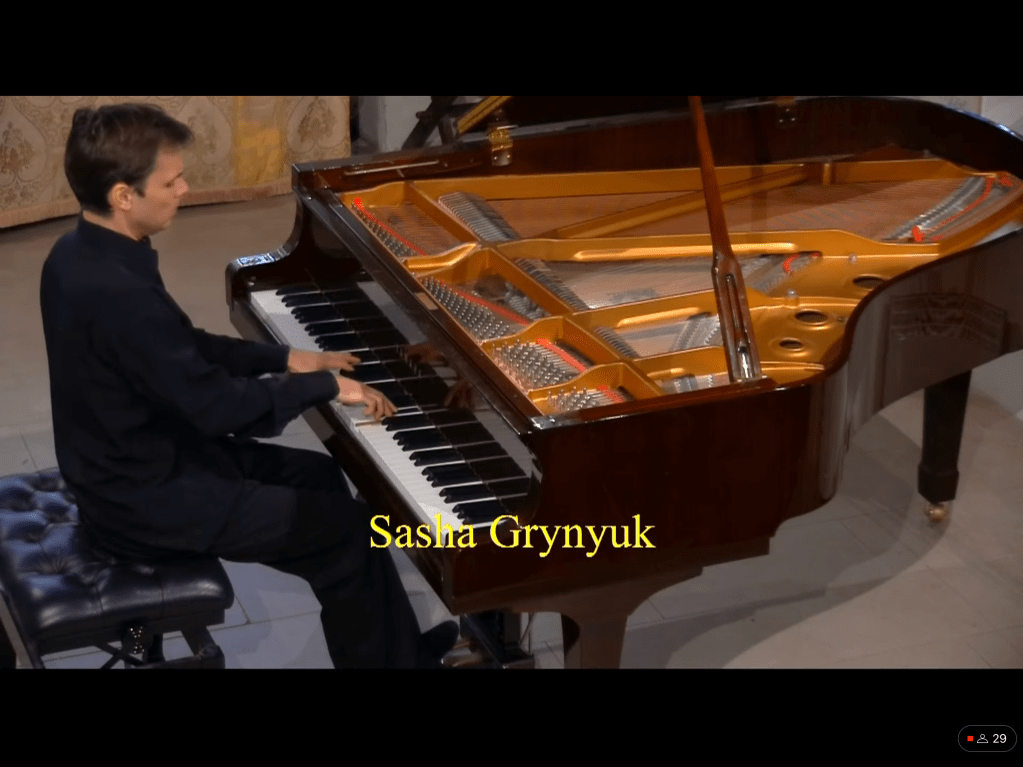
Sasha Grynyuk gave a performance of the F minor Fantasy of such authority and passion where the transcendental arpeggiando chords were of burning intensity.Fearless almost reckless they took our breath away with their audacity.There was great weight to the melodic line of the central episode that just grew so naturally out of its surrounding.The Mazurkas op 30 were played with ravishing colours and sense of style and three little known waltzes were thrown off with irresistible charm and style.The last in E flat (1830) was a favourite encore of Peter Frankl whose 87th birthday is today.Sasha has much in common with Peter for his intelligent musicianship and sense of style .A technical command of the keyboard at the service always of the music.He like Peter is music’s servant.

I had heard Yuanfan Yang yesterday in an evening dedicated to him by the Chinese community in London in St Johns Smith Square.He played movements from his third and fourth concertos plus one of his solo pieces and improvising on themes given by the audience.His fourth concerto owes more to Hollywood than to Ades but for a musician still only in his mid twenties it was a remarkable display of musicianship.https://christopheraxworthymusiccommentary.com/2022/10/04/yuanfan-yang-a-celebration-in-music-the-universal-language-of-all-nations/
Gold Prize winner a month ago of the Casagrande competition that could in the past boast Perlemuter and Badura Skoda on the jury Yuanfan showed the other side of his remarkable music personality.It was the side he shared with us today with a magnificent account of the 24 Chopin Preludes .Playing now with even more authority than a year ago when I heard him play them in Rome .Yuanfan inhabits a world of his own,the world of music.Anything else is secondary to the message that he carries in his own music and in his music making .A remarkable musician and man whose performance of the Preludes today must surely rank with the greatest of performances that we could hear on the concert platform today.
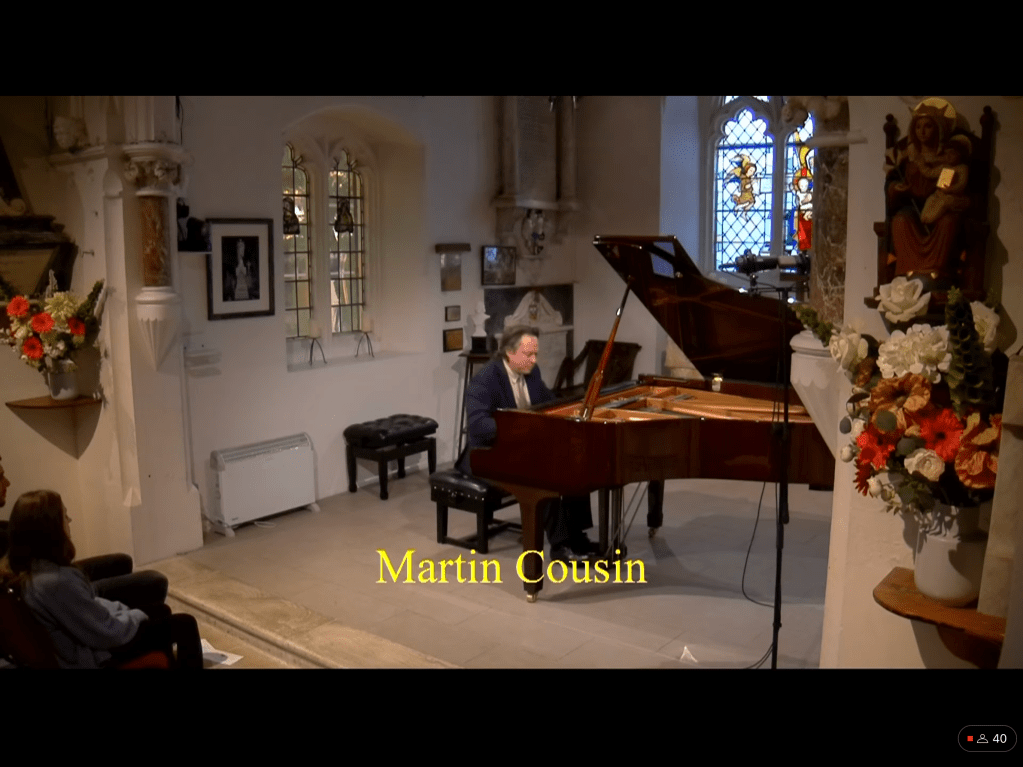
The final two recitals this afternoon started with a fascinating performance of the rarely heard Bolero played with great panash and infectious rhythmic verve.It was the same grandiosity that Martin Cousins brought to the famous Polonaise Héroique.If the cavalry were a little hard footed it may have been because he was tied to the score and this is one piece where as Rubinstein had shown us so often showmanship and freedom are essential ingredients for this the most majestic of Chopin’s compositions.The two nocturnes however were given intimate performances of great beauty with the solidity and musicianship of consummate artistry.
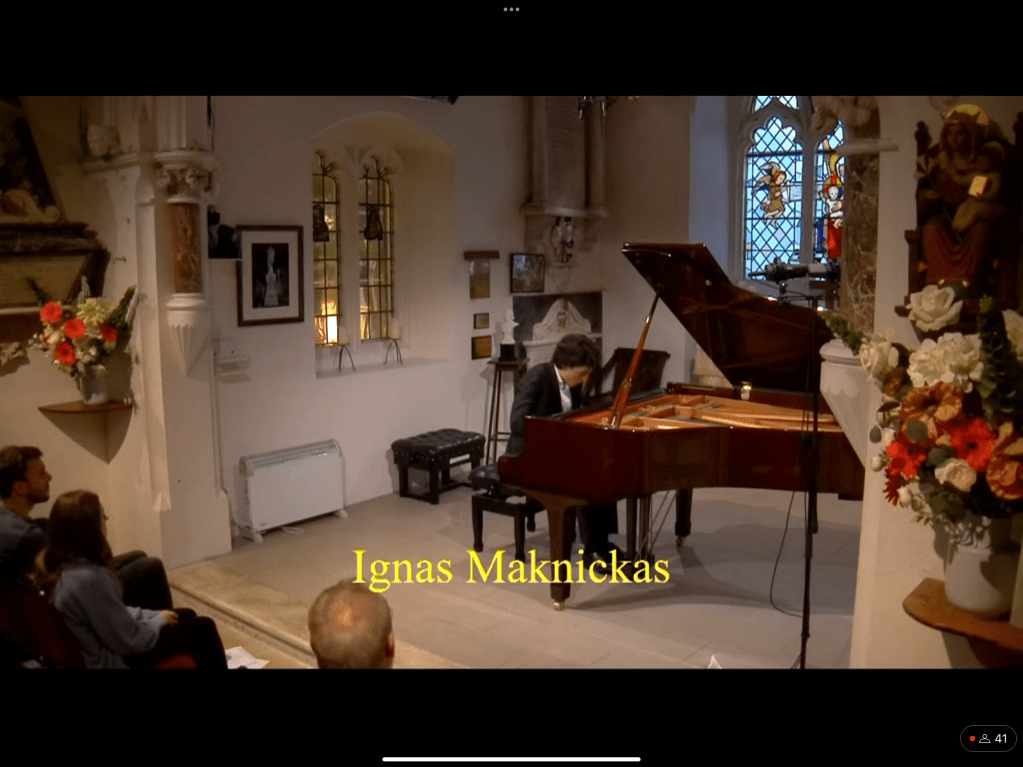
Ignas Macknickas is a young musician who I heard four years ago playing Mozart double concerto with Alim Baesembayev (the winner of the last Leeds Competition)I had noticed his natural technique long fingers and relaxed arms that gave such fluidity and luminosity to all he did.A natural talent that has at last realised that playing the piano is 90% hard work and 10% God given talent.So it was wonderful to see this young man now flowering into an artist of stature with a performance of one of the greatest works of the Romatic era – the fourth ballade.Together with the Liszt Sonata and Schumann Fantasy these are the very pinnacle of inspiration.
His performance was of great fluidity and authority.Beautiful luminous sounds and a naturalness of movement that was mirrored in the ravishing beauty of the sound he produced .The treacherous coda was played with great excitement but shaped with artistry.The same artistry he had brought to the two nocturnes op 27 with the penombre of the first and the radiant luminosity of the second .The mazurkas too were played with that youthful spirit and sense of ‘joie de vivre’ that was a hallmark of all he did.
Chopin Festival Session 5: 7.00 Julian Jacobson Polonaise in C sharp minor Op 26 no 1, Mazurkas Op 33, Polonaise in C minor Op 40 no 2, Mazurka in F minor Op 68 no 4, Polonaise in F sharp minor Op 44
7.50 Roman Kosyakov Fantasy-Impromptu Op 66, Mazurkas Op 17, Nocturne in C minor Op 48 no 1, Ballade no 2 in F Op 38,
8.30 interval
8.45 Cristian Sandrin Nocturne in B Op 62 no 1, Sonata no 3 in B minor Op 58
9.25 Rokas Valuntonis Nocturne in F sharp Op 15 no 2, Études Op 10
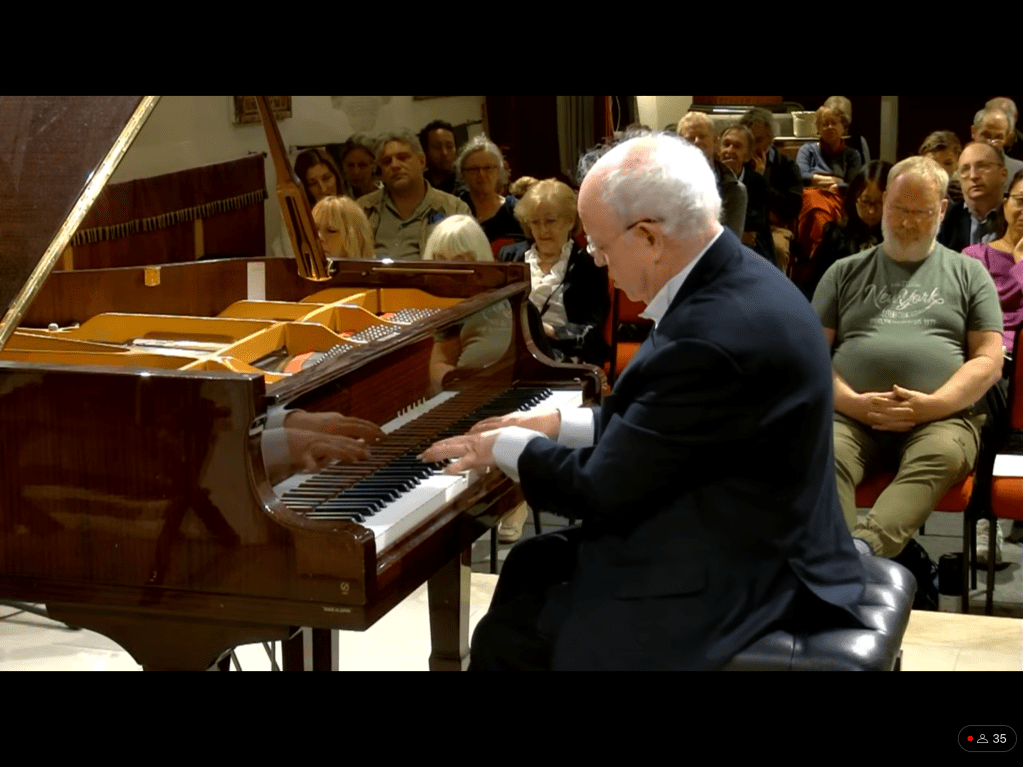
And so to the final session of this extraordinary festival.
It was Julian Jacobson who had pondered through the night of how to making a really fitting contribution to this extraordinary event .He had recently found in the Fontana archives the missing page to the Mazurka in F minor op 68 n.4.A page that Chopin had written on his death bed and had only just the strength to write the bare notes.But notes of such chromaticism that pointed to the future even in his final hours.He prepared it during the morning of the concert as a surprise gift from an extraordinary musicologist.
Julian is also a very fine pianist who plays the entire piano repertoire.He will be playing the 32 Beethoven Sonatas soon from memory in Central London.Starting at 10 am with op 2 and finishing at 10 pm with op 111.
He recently played 7,45 minute recitals on a cruise ship in the Americas as his duo partner was indisposed at the last minute.An amazing musical mind that could contemplate such a tour de force.
Adding three polonaises and the mazurkas op 33 to his programme he gave performances where music just seemed to pour from him so naturally .The Mazukas in particular were played with such live wire colours and rhythms that they seemed almost improvised such was their freshness .The great C minor Polonaise op 40 was played with heartrending nobility and op 26 with its youthful call to arms and joyously innocent dance rhythms.The great F sharp minor Polonaise was played with aristocratic nobility and the complex middle mazurka episode was allowed to flow with a compelling natural forward movement .
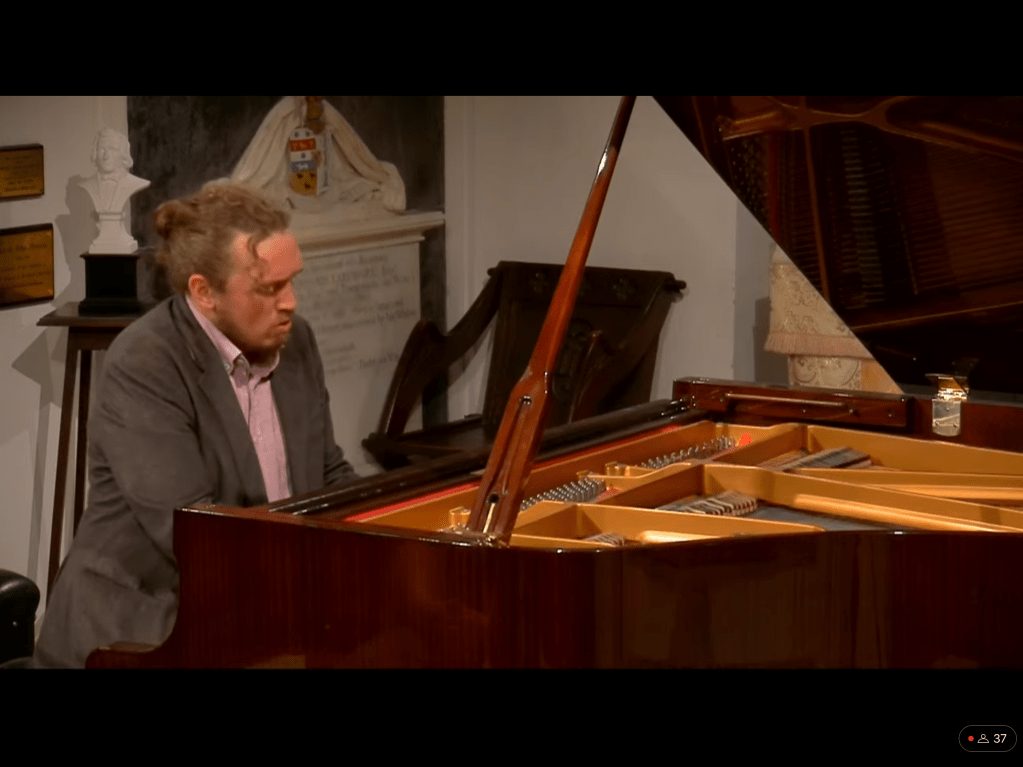
Roman Korsyakov’s agile fingers allowed the Fantasie Impromptu to weave its magic web with beguiling colours and passion.The beautiful middle episode sang with pleading sincerity.Roman’s superb sense of balance allowing the melodic line to sing with such subtle colouring which was the hallmark of his remarkable performance of the C minor nocturne that followed A miniature tone poem and one of the greatest of nocturnes played with a remarkable sense of grandeur and poetic beauty.The same beauty he brought to the second ballade but where also his transcendental control of the piano allowed the tempestuous interruptions to astonish and excite before dying away to a mere whisper.
Roman winner of the 2019 Hastings Competition gave him a triumphant London debut with the Royal Philharmonic Orchestra and he has recently ignited the enthusiasm of the audiences on Cyprus in a recital for the Keyboard Trust of which he is a distinguished artist.

CrIstian Sandrin by coincidence was to be the duo partner on Julian’s cruise but was called to his father’s bedside in Bucharest at the last minute .His father is a distinguished Rumanian pianist who I hope was well enough to watch his son’s remarkably poetic performance of the B minor Sonata ._
An Allegro Maestoso of rare beauty where he took all the time to allow the poetry to be revealed in a timeless flood of song.CrIstian,an Ashkenazy look alike,is born to sit before the keyboard and is a very natural pianist where his movements from on high follow the movement of the music with the same beauty as a Volodos or Giulini.The middle episode of the Scherzo too revealed such poetic truths and contrasted with the scintillating outer episodes played with true jeux perlé of great brilliance.The rondo final movement was paced like a master growing ever more in sound and excitement until the bubble burst with extraordinary virtuosity and brilliance.The nocturne in B too was unraveled in a timeless stream of poignant sounds with trills that were just reverberations from on high adding to the magic atmosphere that he created.
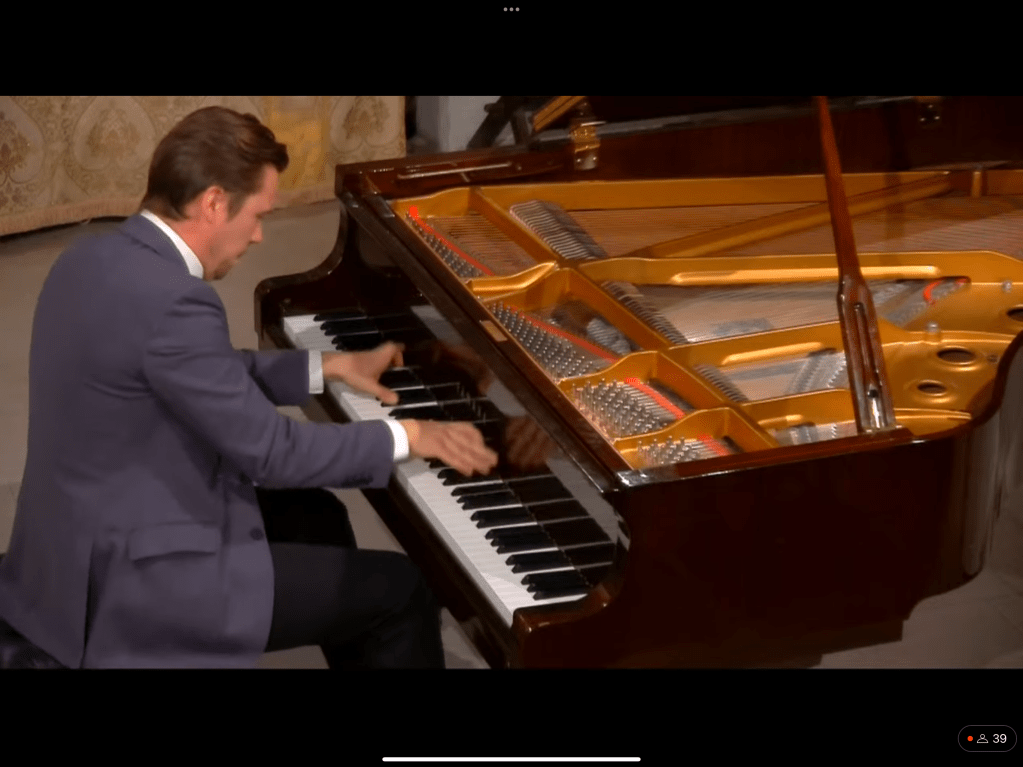
It was Rokas Valuntonis who closed the festival late on Sunday evening.A performance of the F sharp nocturne op 15 that Rubinstein used to play with timeless ease and beauty.Rokas unravelled the beautiful middle episode with the same ease and with a enviable liquid sound .It was the oiled ease of his playing and radiant sound that reminded me of Geza Anda.A technical command of the keyboard and its secret colours that often astonishes .His studies op 10 may not have been the perfection that had astonished a while back in Perivale but it was of such brilliance and style that it was quite unique.The ravishing beauty of the slow third and sixth studies were of a radiance and poetic meaning that had made his Kinderscenen also in Perivale a while back so extraordinarily moving.The opening study was played with a brilliance and ease that was astonishing as was the famous black key study.Just thrown off with an ease but also a musicality that shaped the music in a ravishingly enticing way.If there were moments of doubt ,due to the late hour ,there were none where the music was concerned and I have rarely heard the arpeggio study n.11 played with such jewel like beauty.The passion and virtuosity of the Revolutionary study was a fitting ending to this festival of having the privilege to listening to 12 hours of Chopin’s genius played by such remarkable artists.
It also allowed some of the finest young musicians a platform to share their music with music lovers world wide thanks to the superb streamig facilities that Dr Hugh Mather and his team have created with passion and expertise in this beautiful historic venue.